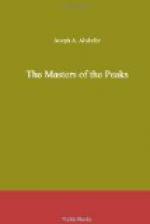“It may be that I can rouse up a deer,” he said. “They are likely to be in the shelter of the thick bushes along the water’s edge, but whether I find them or not I will return shortly after sundown. Do you await me here, Dagaeoga.”
“I won’t stir. I’m too tired,” said Robert.
The Onondaga put on his snowshoes again, and strapped to his back his share of the ammunition and supplies—it had been agreed by the two that neither should ever go anywhere without his half, lest they become separated. Then he departed on smooth, easy strokes, almost like one who skated, and was soon out of sight among the bushes at the edge of the stream. Robert settled back to the warmth and brightness of the fire, and awaited in peace the sound of a shot telling that Tayoga had found the deer.
He had been so weary, and the blaze was so soothing that he sank into a state, not sleep, but nevertheless full of dreams. He saw Willet again, and heard him tell the tale how he had reached the lake and the army with Garay’s letter. He saw Colonel Johnson, and the young English officer, Grosvenor, and Colden and Wilton and Carson and all his old friends, and then he heard a crunch on the snow near him. Had Tayoga come back so soon and without his deer? He did not raise his drooping eyelids until he heard the crunch again, and then when he opened them he sprang suddenly to his feet, his heart beating fast with alarm.
A half dozen dark figures rushed upon him. He snatched at his rifle and tried to meet the first of them with a bullet, but the range was too close. He nevertheless managed to get the muzzle in the air and pull the trigger. He remembered even in that terrible moment to do that much and Tayoga would hear the sharp, lashing report. Then the horde was upon him. Someone struck him a stunning blow on the side of the head with the flat of a tomahawk, and he fell unconscious.
When he returned to the world, the twilight had come, the hole in the snow had been enlarged very much, and so had the fire. Seated around it were a dozen Indians, wrapped in thick blankets and armed heavily, and one white man whose attire was a strange compound of savage and civilized. He wore a three-cornered French military hat with a great, drooping plume of green, an immense cloak of fine green cloth, lined with fur, but beneath it he was clothed in buckskin.
The man himself was as picturesque as his attire. He was young, his face was lean and bold, his nose hooked and fierce like that of a Roman leader, his skin, originally fair, now tanned almost to a mahogany color by exposure, his figure of medium height, but obviously very powerful. Robert saw at once that he was a Frenchman and he felt instinctively that it was Langlade. But his head was aching from the blow of the tomahawk, and he waited in a sort of apathy.
“So you’ve come back to earth,” said the Frenchman, who had seen his eyes open—he spoke in good French, which Robert understood perfectly.




